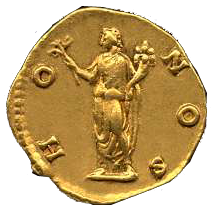
Honos or Honor was the Roman god personifying honor. He was closely associated with Virtus, the goddess of manliness, or bravery, and the two are frequently depicted together. Honos is typically shown wearing a chaplet of bay leaves, while Virtus is identified by her helmet.
The gens Tullia was a family at ancient Rome, with both patrician and plebeian branches. The first of this gens to obtain the consulship was Manius Tullius Longus in 500 BC, but the most illustrious of the family was Marcus Tullius Cicero, the statesman, orator, and scholar of the first century BC. The earliest of the Tullii who appear in history were patrician, but all of the Tullii mentioned in later times were plebeian, and some of them were descended from freedmen. The English form Tully, often found in older works, especially in reference to Cicero, is now considered antiquated.
Cispius is the nomen of the Roman gens Cispia.
Decimus Junius Silanus was a consul of the Roman Republic. He may have been the son of Marcus Junius Silanus, consul in 109 BC. He was the stepfather of Marcus Junius Brutus, having married Brutus' mother, Servilia.

The gens Didia, or Deidia, as the name is spelled on coins, was a plebeian family at ancient Rome, which first appears in history during the final century of the Republic. According to Cicero, they were novi homines. Titus Didius obtained the consulship in 98 BC, a dignity shared by no other Didii until imperial times.
The gens Aelia, occasionally written Ailia, was a plebeian family in Rome, which flourished from the fifth century BC until at least the third century AD, a period of nearly eight hundred years. The archaic spelling Ailia is found on coins, but must not be confused with Allia, which is a distinct gens. The first member of the family to obtain the consulship was Publius Aelius Paetus in 337 BC.

The writings of Marcus Tullius Cicero constitute one of the most renowned collections of historical and philosophical work in all of classical antiquity. Cicero was a Roman politician, lawyer, orator, political theorist, philosopher, and constitutionalist who lived during the years of 106–43 BC. He held the positions of Roman senator and Roman consul (chief-magistrate) and played a critical role in the transformation of the Roman Republic into the Roman Empire. He was extant during the rule of prominent Roman politicians, such as those of Julius Caesar, Pompey, and Marc Antony. Cicero is widely considered one of Rome's greatest orators and prose stylists.
The gens Ancharia, occasionally written Ancaria, was a plebeian family at ancient Rome. The first of the gens to achieve prominence was Quintus Ancharius, a senator early in the first century BC.

The gens Caecilia was a plebeian family at ancient Rome. Members of this gens are mentioned in history as early as the fifth century BC, but the first of the Caecilii who obtained the consulship was Lucius Caecilius Metellus Denter, in 284 BC. The Caecilii Metelli were one of the most powerful families of the late Republic, from the decades before the First Punic War down to the time of Augustus.

The gens Sestia was a minor patrician family at ancient Rome. The only member of this gens to obtain the consulship in the time of the Republic was Publius Sestius Capitolinus Vaticanus, in 452 BC.
The gens Sextilia was a plebeian family at ancient Rome. The first member of this gens to achieve prominence was Gaius Sextilius, consular tribune in 379 BC. None of the family obtained the consulship, but they endured throughout Roman history from the early Republic into imperial times.
The gens Egnatia was a plebeian family of equestrian rank at ancient Rome. Only a few of the Egnatii held any magistracies, of whom the most important may have been Gnaeus Egnatius, who held the praetorship during the second century BC, and served as governor of Macedonia, shortly after its institution as a Roman province.

Epistulae ad Familiares is a collection of letters between Roman politician and orator Marcus Tullius Cicero and various public and private figures. The letters in this collection, together with Cicero's other letters, are considered the most reliable sources of information for the period leading up to the fall of the Roman Republic. Traditionally spanning 16 books, and featuring letters from 62 to 43 BCE, the collection was likely first published by Cicero's freedman and personal secretary Marcus Tullius Tiro sometime after Cicero's death in 43 BCE.
The gens Gratidia was a plebeian family at ancient Rome. Originally coming from Arpinum, members of this gens are known from the final century of the Republic.
The gens Laenia was a minor family at Rome during the first century BC. It is remembered chiefly from two individuals, one a friend of Varro, the other of Cicero. Both had houses at Brundisium, suggesting either that the family came from that region, or that the individuals mentioned were closely related.

The gens Neria was a minor plebeian family at Rome. Members of this gens are first mentioned in the time of Caesar, when Gnaeus Nerius was quaestor, but few if any others are known to have held Roman magistracies. Many Nerii are known from inscriptions. A coin issued by the quaestor Nerius depicts the head of Saturn on the obverse, and standards labeled with the names of the consuls on the reverse, perhaps alluding to Caesar having broken open the treasury, or showing the legitimacy of the Senate to the legions against the rebellion of Caesar.
The gens Numeria was a minor plebeian family at ancient Rome. Few of its members held any of the higher offices of the Roman state.
The gens Rupilia, occasionally written Rupillia, was a minor plebeian family at ancient Rome. Members of this gens are first mentioned in the latter part of the Republic, and Publius Rupilius obtained the consulship in 132 BC. Few others achieved any prominence, but the name occurs once or twice in the consular fasti under the Empire. The name is frequently confounded with the similar Rutilius.
The gens Trebellia, occasionally written Trebelia, was a plebeian family at ancient Rome. Members of this gens are first mentioned at the time of the Second Punic War, but they played little role in the Roman state until the final decades of the Republic. Trebellii are known from inscriptions in Delos and in Athens between 150 and 89 BC. The most illustrious of the Trebellii was Marcus Trebellius Maximus, who attained the consulship in AD 55.
![]() This article incorporates text from a publication now in the public domain : Smith, William (1870). "Q. Ancharius". In Smith, William (ed.). Dictionary of Greek and Roman Biography and Mythology . Vol. 1. p. 167.
This article incorporates text from a publication now in the public domain : Smith, William (1870). "Q. Ancharius". In Smith, William (ed.). Dictionary of Greek and Roman Biography and Mythology . Vol. 1. p. 167.





